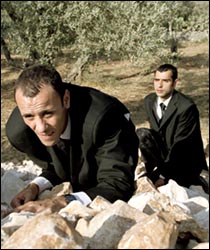 I’ve had the good fortune of seeing both Munich and Paradise Now over the past few months and both films have given me greater insight into the seemingly never-ending struggle between Israelis and Palestinians.
I’ve had the good fortune of seeing both Munich and Paradise Now over the past few months and both films have given me greater insight into the seemingly never-ending struggle between Israelis and Palestinians.Munich was about Israel's response to the killing of their athletes at the 1972 Olympics -- sending assassins after the Palestinian planners of Black September. Paradise Now’s perspective followed two West Bank friends chosen to be suicide bombers as they prepare for and struggle with their mission.
Both films began with the belief that violence must be met with violence. In Munich, Israeli Prime Minister Golda Mier say civilizations must sometimes compromise their values, as they defend their right to exist. Said and Khaled, the protagonists of Paradise Now, feel they are trapped in an open–air prison with no future and no respect, kept down by the military and economic might of Israel, responding to their planes with explosives strapped to their bodies.
By the end of the films, the black and white issues have considerably grayed. Avner, the lead assassin questions the effectiveness and the justice of the counterterrorist response that only appears to be breeding new resistance. In Paradise, only one of the two bombers heads into Israel, ready to carry out his destructive plan, only coming to that decision after debating with a resistance leader who argues that in killing there is no difference between victim and occupier.
Munich may net director Steven Spielberg an Oscar nomination in a couple of weeks and is in theatres now. Paradise Now just won a Golden Globe for Best Foreign Film and you can catch it at rep theatres. They will add to your understanding of a complex situation as both films come to the inevitable conclusion: the cycle of violence is leading nowhere.










No comments:
Post a Comment